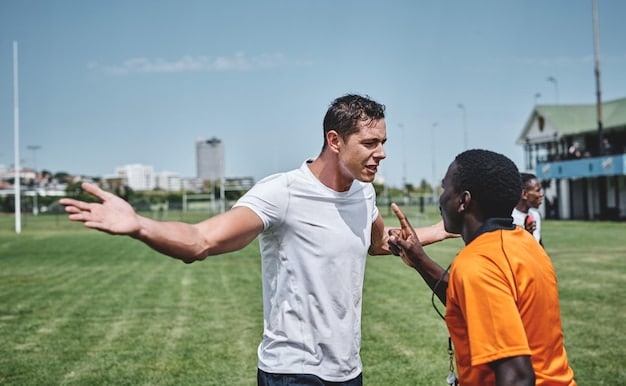Volunteer Coaching: How to Give Back Through Local Youth Sports

Becoming a volunteer coach for local youth sports teams is a rewarding way to give back to the community, offering kids guidance, mentorship, and the opportunity to develop skills and a love for the game.
Want to make a difference in your community and help young athletes thrive? Becoming a volunteer coach for local youth sports teams is a fantastic way to give back, share your passion for sports, and positively impact the lives of children.
Why Volunteer as a Youth Sports Coach?
Volunteering as a youth sports coach offers tremendous benefits, both for the community and for you personally. It’s more than just teaching kids how to play a game; it’s about shaping their character, fostering teamwork, and building a positive environment.
Impacting Young Lives
As a coach, you become a role model, teaching valuable life lessons about sportsmanship, discipline, and perseverance. You help children develop their physical skills, learn the importance of teamwork, and build confidence in their abilities.
Strengthening the Community
Youth sports programs are vital for community development, providing a safe and structured environment for kids to learn and grow. By volunteering, you contribute to the well-being of your community and help create a positive future for its youth.
- Providing positive role models for children.
- Creating opportunities for physical activity and skill development.
- Building a sense of community and belonging.
- Teaching valuable life skills like teamwork and sportsmanship.
Becoming a volunteer coach is also personally rewarding. Watching young athletes improve their skills, overcome challenges, and achieve their goals is an immensely satisfying experience. You’ll also develop your own leadership, communication, and organizational skills.

Essential Skills and Qualities for a Youth Sports Coach
While a deep knowledge of the sport you’re coaching is helpful, certain essential skills and qualities are crucial for success. These include effective communication, patience, and a genuine desire to work with children.
Communication and Leadership
A good coach can communicate effectively with players, parents, and other coaches. Clear and concise instructions, positive reinforcement, and constructive feedback are all essential communication tools. Strong leadership skills are also important for managing a team and creating a positive team dynamic.
Patience and Empathy
Working with young athletes requires patience, understanding, and empathy. Remember that children learn at different paces, and mistakes are part of the learning process. Creating a supportive and encouraging environment where players feel comfortable taking risks is crucial for their development.
- Demonstrating patience when teaching new skills.
- Understanding the different learning styles and abilities of each player.
- Providing positive reinforcement and constructive feedback.
- Creating a fun and encouraging learning environment.
Beyond the technical aspects of coaching, having a genuine love for the sport and a desire to share that passion with others is important. Your enthusiasm will be contagious and inspire your players to love the game as much as you do.
Finding Local Youth Sports Coaching Opportunities
Ready to start your journey as a volunteer coach? Numerous organizations offer opportunities to get involved in youth sports. Look into community centers, schools, and local sports leagues to discover avenues for volunteering.
Community Centers and Schools
Many community centers and schools have established youth sports programs that rely on volunteer coaches. Contact your local community center or school athletic department to inquire about available opportunities. They often have a range of sports to choose from, catering to different age groups and skill levels.
Local Sports Leagues
Local sports leagues, such as Little League baseball, Pop Warner football, and YMCA basketball, are constantly seeking dedicated volunteer coaches. These leagues provide organized sports programs for children of all ages. Check their websites or attend local meetings to learn about coaching opportunities.

- Researching local sports organizations online.
- Contacting community centers and schools.
- Attending league meetings or events.
- Networking with other parents and coaches.
Don’t be afraid to reach out to multiple organizations and inquire about their volunteer coaching needs. The more inquiries you make, the greater your chances of finding a good fit for your skills and interests.
The Application and Screening Process
Before you can start coaching, most organizations require you to complete an application and undergo a screening process. This ensures the safety and well-being of the children involved in the program.
Background Checks and Training
Background checks are standard procedure for all volunteer coaches. Organizations want to ensure that individuals working with children have a clean criminal record. You may also be required to complete training courses on topics such as child safety, first aid, and coaching techniques.
Interviews and References
Some organizations may conduct interviews with potential coaches to assess their suitability for the role. They may also request references from individuals who can vouch for your character and experience working with children. Be prepared to answer questions about your coaching philosophy, your ability to handle challenging situations, and your commitment to the program.
The application and screening process may seem daunting, but it’s a crucial step in protecting young athletes and ensuring a safe and positive environment for everyone involved. Take the time to complete the process thoroughly and honestly.
Planning and Conducting Effective Practices
Once you’re selected as a volunteer coach, your primary responsibility will be planning and conducting effective practices. Practices shouldn’t just be about drills, they should be about instilling fundamental knowledge, creating a fun atmosphere.
Age-Appropriate Drills and Activities
Design your practices to be age-appropriate and engaging for the athletes you coach. Younger children need more variety and shorter attention spans, while older athletes can handle more complex drills and strategies. Make sure your practices are challenging but not overwhelming, and focus on developing fundamental skills before moving on to more advanced techniques.
Creating a Fun and Positive Environment
Practice should be a fun and positive experience for young athletes. Incorporate games, challenges, and friendly competitions to keep them motivated and engaged. Celebrate successes, both big and small, and provide encouragement even when players make mistakes. Remember that the goal is to help them develop a love for the sport and build their confidence.
- Focusing on skill development and fundamentals.
- Keeping practices organized and structured.
- Incorporating games and fun activities.
- Providing positive feedback and encouragement.
Planning practices ahead of time is vital. Having a schedule and knowing what drills you have planned removes any confusion when the players arrive. It will maximize time and will eliminate periods of inactivity.
Effective Communication with Parents
Open and honest communication with parents is essential for a successful youth sports program. Parents are valuable partners in the development of their children, and their support can make a significant difference.
Setting Expectations and Maintaining Transparency
At the beginning of the season, clearly communicate your coaching philosophy, team rules, and expectations for players and parents. Encourage open communication and be responsive to parent concerns. Maintain transparency in your decision-making process and be fair and consistent in your treatment of all players.
Addressing Concerns and Conflicts
Conflicts can arise in youth sports, whether it’s about playing time, team roles, or coaching decisions. Be prepared to address these issues promptly and professionally. Listen to all perspectives, remain calm and objective, and work towards a resolution that is fair and in the best interest of the team and the players.
- Establishing clear communication channels.
- Being responsive to parent inquiries.
- Addressing concerns promptly and professionally.
- Maintaining transparency in decision-making.
Treat all parents with equality. Showing favor to certain children will create division within the team and the parents will sense that immediately. Encourage teamwork, even among the parents.
| Key Point | Brief Description |
|---|---|
| 🏆 Impact Young Lives | Be a positive influence by teaching sportsmanship and discipline. |
| 🤝 Strengthen Community | Contribute to youth well-being and create future opportunities. |
| ✅ Essential Skills | Communicate effectively, be patient, and share your passion. |
| 📝 Application Process | Complete background checks, training, and provide references. |
FAQ
▼
You can positively impact young lives, strengthen community bonds, develop personal leadership skills, and share your love of sports.
▼
Effective communication, patience, empathy, and a genuine desire to work with children are crucial for successful coaching.
▼
Check community centers, schools, and local sports leagues like Little League or YMCA for openings. Don’t hesitate to make inquiries!
▼
Expect background checks, training courses (child safety, first aid), interviews, and possibly reference checks to ensure children’s safety.
▼
Communication is vital, keep the parents updated on practice, games and coaching methodology. This builds transparency among the team and its supporters.
Conclusion
Becoming a volunteer coach for local youth sports is a fulfilling experience that benefits you and your community. By sharing your knowledge and passion, you can make a lasting impact on the lives of young athletes and help them develop valuable life skills.





